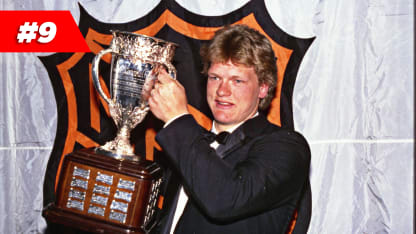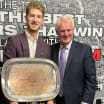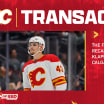While the rugged, all-heart Clark had already been tagged to lead the sadsack Maple Leafs out of the wilderness, Calgary's freshman D-man was just fighting for a roster spot on the big club.
What Suter had on his side, though, was maturity, a collegiate tie with coach Bob Johnson and a position for a left-handed blueliner open with Kari Eloranta's return to Finland.
"That whole year,'' reflects Suter now, "was magical for me. I came in hoping to make the team. Had a good camp. Did real well in the fitness testing.
"Then Badger Bob put me on the powerplay right away. And (Al) MacInnis and I clicked, almost immediately.
"Everything went right. Just being in the league, going into all these new buildings … such an adrenalin rush.
"It kinda snowballed for me."
The highlight of his season arrived on April 4, 1986, when Suter singed the hated Oilers for a club record six assists - four in the second period alone - as the Flames roasted Edmonton 9-3, a precursor of their astounding seven-game upset in the second round of the post-season.
MacInnis, who would form a kinetic partnership with Suter, could see the latent ability.
"No. 1,'' says MacInnis, "Gary was such a great skater. He moved the puck so well. Had poise beyond his years. Badger wasn't afraid to use him in any situation. He finished with what, 18 goals and 68 points? Those would have been really good numbers for any defenceman, let alone a first-year guy.
"He may have been a 'rookie' but he certainly didn't play like one."
As the season wound down, Clark - who'd finish with 34 goals, 45 points and a whopping 227 PIM - seemed the clear frontrunner. No Leaf since Dave Keon in '67 had won the Calder, or indeed any post-season award, generating a groundswell of support for the bruising winger.
Suter, meanwhile, had excelled in a position renowned for being extremely difficult to master for young players.
Other viable Calder candidates included Canadiens' freshman goalie Patrick Roy - 23-18-3 record with a 3.35 GAA - and his Montreal teammate Kjell Dahlin - 32 goals, which tied Mats Naslund's franchise record for rookies, and 71 points, a new Habs' freshman high.
Suter, Clark and Dahlin survived the first cutdown and were named Calder finalists.
On Jan. 10, 1986, at the Toronto Convention Centre, the Professional Hockey Writers Association voted Suter the prize.
And he won in surprisingly dominant fashion: Tallying 230 points on 35 first-place votes to runner-up Clark's 165 points.
"It was,'' says Suter now, "a validation of leaving college early. I didn't want to leave and end up being in the minor leagues.
"So in a way it was a calculated gamble on my part. I had to believe in myself, that I could actually stay in the NHL.
"I also remember them putting a rookie-of-the-year bonus into that first contract, where I finished in the voting.
"And I'm thinking 'Yeah, right. That'll never get collected.'
"But as it turned out …"



















